Avoid being scammed by the "Double Your BTC" emails/website
Phishing/ScamAlso Known As: Double Your BTC spam
Get free scan and check if your device is infected.
Remove it nowTo use full-featured product, you have to purchase a license for Combo Cleaner. Seven days free trial available. Combo Cleaner is owned and operated by RCS LT, the parent company of PCRisk.com.
What is the "Double Your BTC" scam email?
"Double Your BTC" is a spam campaign, a mass-scale operation during which deceptive emails are sent by the thousand. These messages promote a scam website promising to double the BTC (Bitcoin cryptocurrency) recipients invest in it.
Note that all of the information provided by "Double Your BTC" emails is false. Therefore, by trusting them, users can experience financial loss and possibly other serious issues.
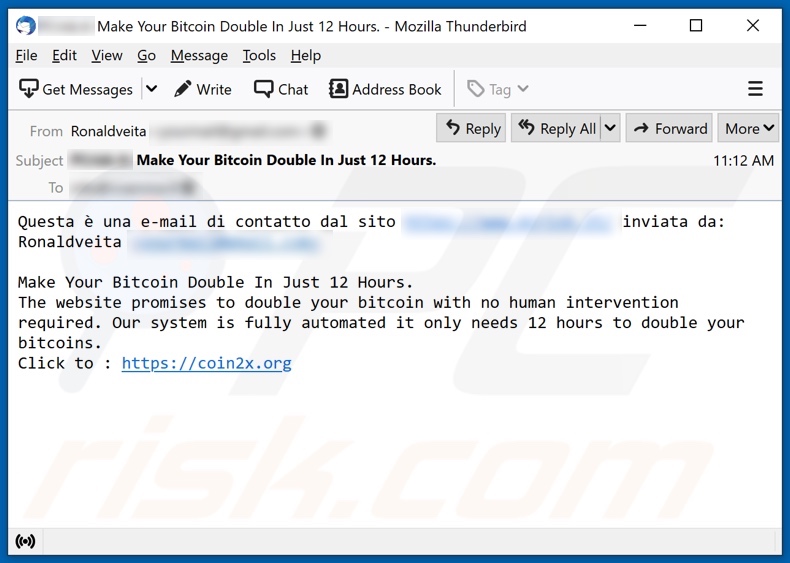
The "Double Your BTC" scam emails inform recipients that they can double their Bitcoins in twelve hours. The messages promote a website offering this fake service, which is supposedly fully automatic and operates with no human involvement. The link in these emails redirects to a bogus site.
The text presented in this web page repeats the promise of doubling Bitcoin cryptocurrency users transfer to its service. Instead of the process allegedly taking twelve hours, the site states that it takes twenty four.
The page also contains false information about how many transactions it has doubled and the total sum paid out.
The smallest investment users can make is 0.005 BTC (equivalent to approximately US$200 USD), the largest 10 BTC (approx US$500,000). Note, exchange rates fluctuate.
As mentioned, the claims made by the spam emails/scam website are false. Therefore, regardless of how much users "invest" in the "service", they will receive nothing in return and only experience financial losses.
| Name | Double Your BTC Email Scam |
| Threat Type | Phishing, Scam, Social Engineering, Fraud |
| Fake Claim | Emails claim recipients can double the Bitcoins they invest through the promoted website. |
| Related Domain | coin2x[.]org |
| Detection Names (coin2x[.]org) | CyRadar (Malicious), Fortinet (Malware), Netcraft (Malicious), SCUMWARE.org (Malware), Full List Of Detections (VirusTotal) |
| Serving IP Address (coin2x[.]org) | 172.67.199.192 |
| Symptoms | Unauthorized online purchases, changed online account passwords, identity theft, illegal access of the computer. |
| Distribution methods | Deceptive emails, rogue online pop-up ads, search engine poisoning techniques, misspelled domains. |
| Damage | Loss of sensitive private information, monetary loss, identity theft. |
| Malware Removal (Windows) |
To eliminate possible malware infections, scan your computer with legitimate antivirus software. Our security researchers recommend using Combo Cleaner. Download Combo CleanerTo use full-featured product, you have to purchase a license for Combo Cleaner. 7 days free trial available. Combo Cleaner is owned and operated by RCS LT, the parent company of PCRisk.com. |
Spam campaigns are used for various scams, phishing, and malware (e.g., trojan, ransomware, etc.) proliferation.
The deceptive emails are usually disguised as "official", "urgent", "important", "priority", and similar. "MOBI GRAND TELECOM Lottery", "Clustered E-mails Pending", "cPanel Email Scam", and "U.S Army Special Operations Command Consignment" are some examples of other spam campaigns, and "Double Your Bitcoins", "Doge Giveaway", "Generate Bitcoin" of online schemes similar to "Double Your BTC".
Regardless of what the scam messages claim, offer, request, or demand, the end-goal is always the same: to generate revenue for the scammers/cyber criminals behind them. Due to the prevalence of this mail, exercise caution with incoming emails.
How do spam campaigns infect computers?
Malware (including ransomware) is usually distributed via malspam campaigns, unofficial software activation ('cracking') tools, Trojans, dubious file/software download sources, and fake software updating tools.
When cyber criminals attempt to distribute malware via malspam campaigns, they send emails that contain malicious attachments or download links for malicious files. Typically, they disguise their emails as official and important. If recipients open the attached file (or a file downloaded via a website link), they cause installation of malicious software.
Cyber criminals commonly attach executable files (.exe), archive files such as RAR, ZIP, PDF documents, JavaScript files and Microsoft Office documents to their emails. Software 'cracking' tools supposedly activate licensed software illegally (bypass activation), however, they often install malicious programs and do not activate any legitimate installed software.
Trojans are other rogue programs that can cause chain infections. I.e., when a Trojan is installed on the operating system, it can install additional malware.
Free file hosting websites, freeware download websites, Peer-to-Peer networks (e.g., torrent clients, eMule), unofficial websites, and third party downloaders are examples of other sources that are used to distribute malware. Cyber criminals disguise malicious files as legitimate and regular. When users download and open them, they inadvertently infect their computers with malware.
Fake software updating tools install malicious software rather than updates/fixes for installed programs, or they exploit bugs/flaws of outdated software that is installed on the operating system.
How to avoid installation of malware
To avoid malware spread via spam mail, you are strongly advised against opening suspicious or irrelevant emails, especially those with any attachments or links present within them.
Additionally, use Microsoft Office versions released after 2010. Malicious programs also proliferate through untrusted download channels (e.g. unofficial and free file-hosting sites, Peer-to-Peer sharing networks and other third party downloaders), illegal software activation ("cracking") tools, and fake updaters.
Therefore, only download from official/verified sources and activate and update software with tools/functions provided by legitimate developers.
To ensure device integrity and user privacy, have a reputable anti-virus/anti-spyware suite installed and kept updated. Furthermore, use these programs to run regular system scans and to remove detected/potential threats.
This software has to be used to run regular system scans and remove detected threats and issues. If you have already opened malicious attachments, we recommend running a scan with Combo Cleaner Antivirus for Windows to automatically eliminate infiltrated malware.
Text presented in the "Double Your BTC" email message:
Subject: ********: Make Your Bitcoin Double In Just 12 Hours.
Questa è una e-mail di contatto dal sito ******** inviata da:
Ronaldveita ********
Make Your Bitcoin Double In Just 12 Hours.
The website promises to double your bitcoin with no human intervention required. Our system is fully automated it only needs 12 hours to double your bitcoins.
Click to : hxxps://coin2x.org
Appearance of the scam website promoted through the "Double Your BTC" spam campaign (GIF):
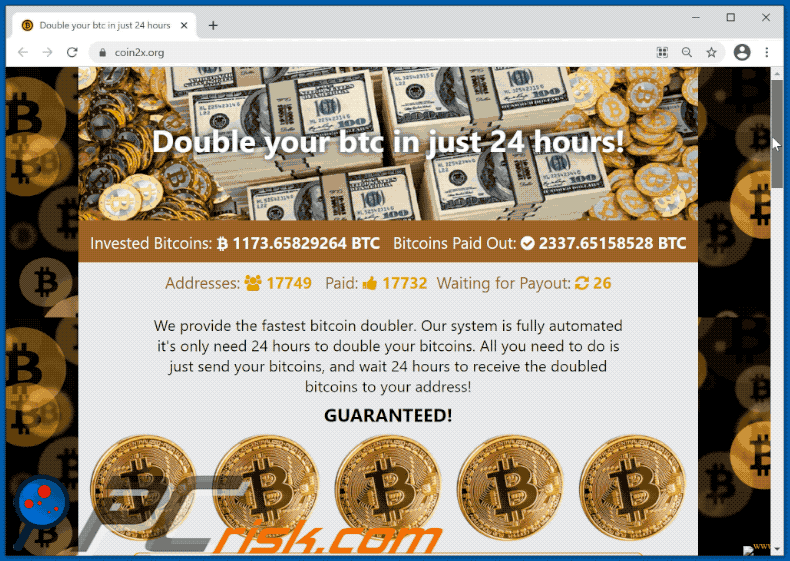
Text presented in this page:
Double your btc in just 24 hours!
Invested Bitcoins: 1173.65829264 BTC Bitcoins Paid Out: 2337.65158528 BTC
Addresses: 17749 Paid: 17732 Waiting for Payout: 26
We provide the fastest bitcoin doubler. Our system is fully automated it's only need 24 hours to double your bitcoins. All you need to do is just send your bitcoins, and wait 24 hours to receive the doubled bitcoins to your address!
GUARANTEED!
Minimum: 0.005 BTC Maximum: 10 BTC
We automatically send your doubled bitcoins back after 24 hours. Be patient!
Your Bitcoin Address for Payout
Double my Bitcoins
Another spam email promoting "Double Your BTC" scam:
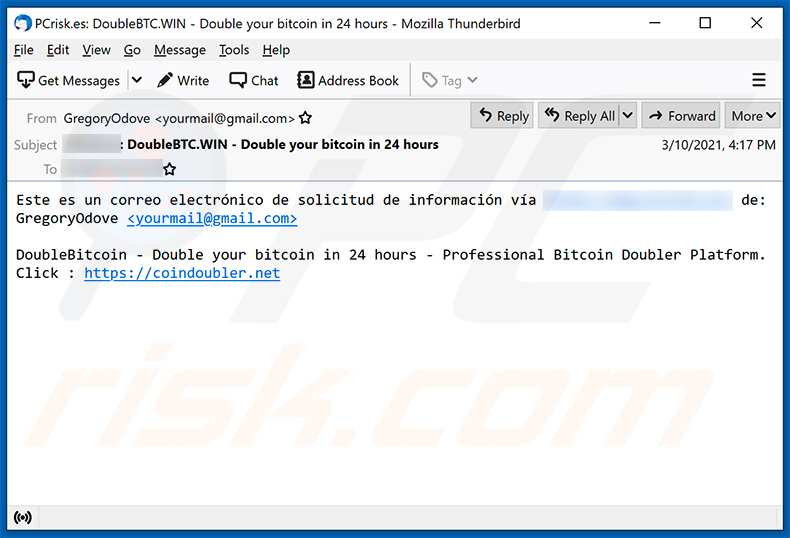
Text presented within:
Subject: ********: DoubleBTC.WIN - Double your bitcoin in 24 hours
Este es un correo electrónico de solicitud de información vía ******** de:
GregoryOdove ;DoubleBitcoin - Double your bitcoin in 24 hours - Professional Bitcoin Doubler Platform. Click : hxxps://coindoubler.net
Screenshot of the promoted scam website (coindoubler[.]net):
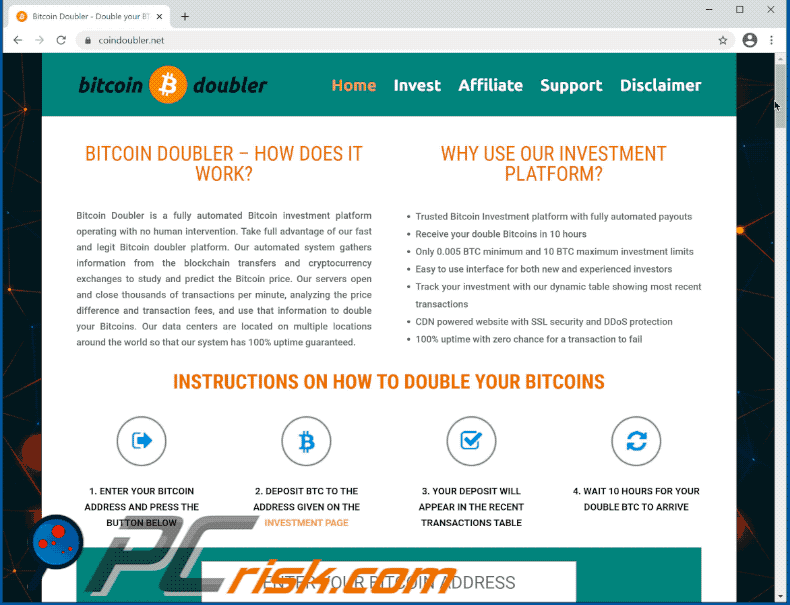
Text presented within this site:
BITCOIN DOUBLER – HOW DOES IT WORK?
Bitcoin Doubler is a fully automated Bitcoin investment platform operating with no human intervention. Take full advantage of our fast and legit Bitcoin doubler platform. Our automated system gathers information from the blockchain transfers and cryptocurrency exchanges to study and predict the Bitcoin price. Our servers open and close thousands of transactions per minute, analyzing the price difference and transaction fees, and use that information to double your Bitcoins. Our data centers are located on multiple locations around the world so that our system has 100% uptime guaranteed.WHY USE OUR INVESTMENT PLATFORM?
Trusted Bitcoin Investment platform with fully automated payouts
Receive your double Bitcoins in 10 hours
Only 0.005 BTC minimum and 10 BTC maximum investment limits
Easy to use interface for both new and experienced investors
Track your investment with our dynamic table showing most recent transactions
CDN powered website with SSL security and DDoS protection
100% uptime with zero chance for a transaction to fail
INSTRUCTIONS ON HOW TO DOUBLE YOUR BITCOINS
1. ENTER YOUR BITCOIN ADDRESS AND PRESS THE BUTTON BELOW
2. DEPOSIT BTC TO THE ADDRESS GIVEN ON THE INVESTMENT PAGE
3. YOUR DEPOSIT WILL APPEAR IN THE RECENT TRANSACTIONS TABLE
4. WAIT 10 HOURS FOR YOUR DOUBLE BTC TO ARRIVEENTER YOUR BITCOIN ADDRESS
DOUBLE MY BITCOINS
BTC DOUBLER STATISTICS: 94298.1154
TOTAL BITCOINS INVESTED 188596.2308
BTC TOTAL IN PAYOUTS
100% SUCCESS RATE ON ALL TRANSACTIONS
Yet another spam email promoting the "Double Your Bitcoin" scam website:
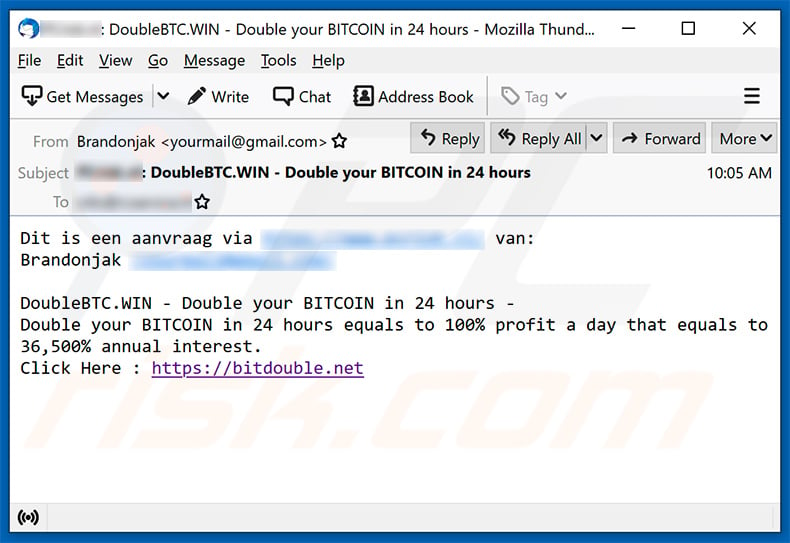
Text presented within:
Subject: ********: DoubleBTC.WIN - Double your BITCOIN in 24 hours
Dit is een aanvraag via ******** van:
Brandonjak ********DoubleBTC.WIN - Double your BITCOIN in 24 hours -
Double your BITCOIN in 24 hours equals to 100% profit a day that equals to 36,500% annual interest.
Click Here : hxxps://bitdouble.net
Screenshot of the promoted scam website (bitdouble[.]net):
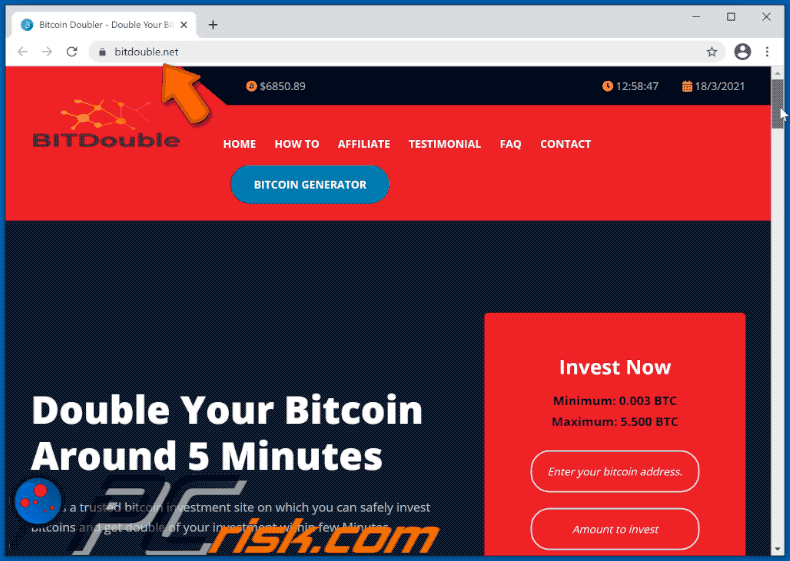
Another example of Bitcoin doubling-themed spam email promoting a scam website:
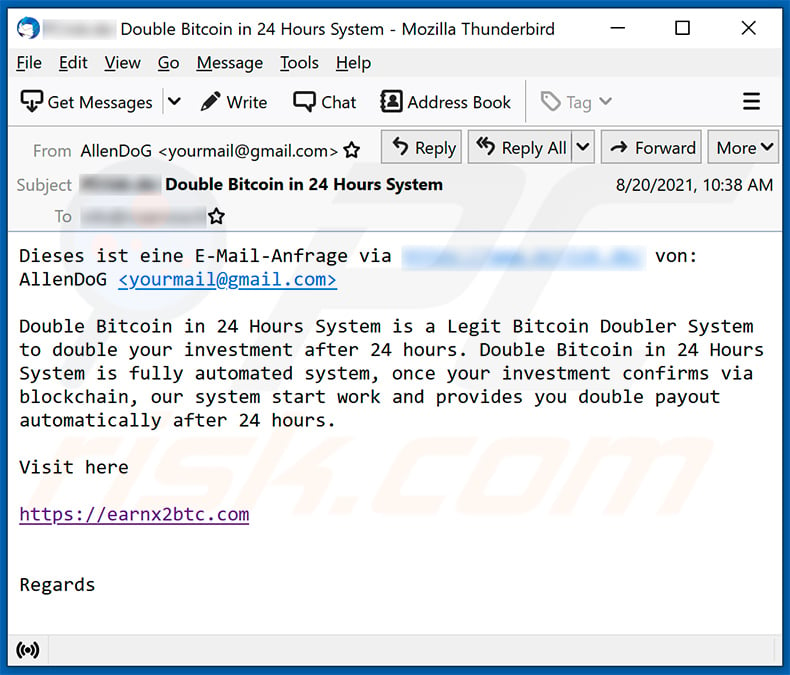
Text presented within:
Subject: ******** Double Bitcoin in 24 Hours System
Dieses ist eine E-Mail-Anfrage via ******** von:
AllenDoG ;Double Bitcoin in 24 Hours System is a Legit Bitcoin Doubler System to double your investment after 24 hours. Double Bitcoin in 24 Hours System is fully automated system, once your investment confirms via blockchain, our system start work and provides you double payout automatically after 24 hours.
Visit here
hxxps://earnx2btc.comRegards
Instant automatic malware removal:
Manual threat removal might be a lengthy and complicated process that requires advanced IT skills. Combo Cleaner is a professional automatic malware removal tool that is recommended to get rid of malware. Download it by clicking the button below:
DOWNLOAD Combo CleanerBy downloading any software listed on this website you agree to our Privacy Policy and Terms of Use. To use full-featured product, you have to purchase a license for Combo Cleaner. 7 days free trial available. Combo Cleaner is owned and operated by RCS LT, the parent company of PCRisk.com.
Quick menu:
- What is Double Your BTC spam?
- Types of malicious emails.
- How to spot a malicious email?
- What to do if you fell for an email scam?
Types of malicious emails:
![]() Phishing Emails
Phishing Emails
Most commonly, cybercriminals use deceptive emails to trick Internet users into giving away their sensitive private information, for example, login information for various online services, email accounts, or online banking information.
Such attacks are called phishing. In a phishing attack, cybercriminals usually send an email message with some popular service logo (for example, Microsoft, DHL, Amazon, Netflix), create urgency (wrong shipping address, expired password, etc.), and place a link which they hope their potential victims will click on.
After clicking the link presented in such email message, victims are redirected to a fake website that looks identical or extremely similar to the original one. Victims are then asked to enter their password, credit card details, or some other information that gets stolen by cybercriminals.
![]() Emails with Malicious Attachments
Emails with Malicious Attachments
Another popular attack vector is email spam with malicious attachments that infect users' computers with malware. Malicious attachments usually carry trojans that are capable of stealing passwords, banking information, and other sensitive information.
In such attacks, cybercriminals' main goal is to trick their potential victims into opening an infected email attachment. To achieve this goal, email messages usually talk about recently received invoices, faxes, or voice messages.
If a potential victim falls for the lure and opens the attachment, their computers get infected, and cybercriminals can collect a lot of sensitive information.
While it's a more complicated method to steal personal information (spam filters and antivirus programs usually detect such attempts), if successful, cybercriminals can get a much wider array of data and can collect information for a long period of time.
![]() Sextortion Emails
Sextortion Emails
This is a type of phishing. In this case, users receive an email claiming that a cybercriminal could access the webcam of the potential victim and has a video recording of one's masturbation.
To get rid of the video, victims are asked to pay a ransom (usually using Bitcoin or another cryptocurrency). Nevertheless, all of these claims are false - users who receive such emails should ignore and delete them.
How to spot a malicious email?
While cyber criminals try to make their lure emails look trustworthy, here are some things that you should look for when trying to spot a phishing email:
- Check the sender's ("from") email address: Hover your mouse over the "from" address and check if it's legitimate. For example, if you received an email from Microsoft, be sure to check if the email address is @microsoft.com and not something suspicious like @m1crosoft.com, @microsfot.com, @account-security-noreply.com, etc.
- Check for generic greetings: If the greeting in the email is "Dear user", "Dear @youremail.com", "Dear valued customer", this should raise suspiciousness. Most commonly, companies call you by your name. Lack of this information could signal a phishing attempt.
- Check the links in the email: Hover your mouse over the link presented in the email, if the link that appears seems suspicious, don't click it. For example, if you received an email from Microsoft and the link in the email shows that it will go to firebasestorage.googleapis.com/v0... you shouldn't trust it. It's best not to click any links in the emails but to visit the company website that sent you the email in the first place.
- Don't blindly trust email attachments: Most commonly, legitimate companies will ask you to log in to their website and to view any documents there; if you received an email with an attachment, it's a good idea to scan it with an antivirus application. Infected email attachments are a common attack vector used by cybercriminals.
To minimise the risk of opening phishing and malicious emails we recommend using Combo Cleaner Antivirus for Windows.
Example of a spam email:

What to do if you fell for an email scam?
- If you clicked on a link in a phishing email and entered your password - be sure to change your password as soon as possible. Usually, cybercriminals collect stolen credentials and then sell them to other groups that use them for malicious purposes. If you change your password in a timely manner, there's a chance that criminals won't have enough time to do any damage.
- If you entered your credit card information - contact your bank as soon as possible and explain the situation. There's a good chance that you will need to cancel your compromised credit card and get a new one.
- If you see any signs of identity theft - you should immediately contact the Federal Trade Commission. This institution will collect information about your situation and create a personal recovery plan.
- If you opened a malicious attachment - your computer is probably infected, you should scan it with a reputable antivirus application. For this purpose, we recommend using Combo Cleaner Antivirus for Windows.
- Help other Internet users - report phishing emails to Anti-Phishing Working Group, FBI’s Internet Crime Complaint Center, National Fraud Information Center and U.S. Department of Justice.
Share:

Tomas Meskauskas
Expert security researcher, professional malware analyst
I am passionate about computer security and technology. I have an experience of over 10 years working in various companies related to computer technical issue solving and Internet security. I have been working as an author and editor for pcrisk.com since 2010. Follow me on Twitter and LinkedIn to stay informed about the latest online security threats.
PCrisk security portal is brought by a company RCS LT.
Joined forces of security researchers help educate computer users about the latest online security threats. More information about the company RCS LT.
Our malware removal guides are free. However, if you want to support us you can send us a donation.
DonatePCrisk security portal is brought by a company RCS LT.
Joined forces of security researchers help educate computer users about the latest online security threats. More information about the company RCS LT.
Our malware removal guides are free. However, if you want to support us you can send us a donation.
Donate
▼ Show Discussion